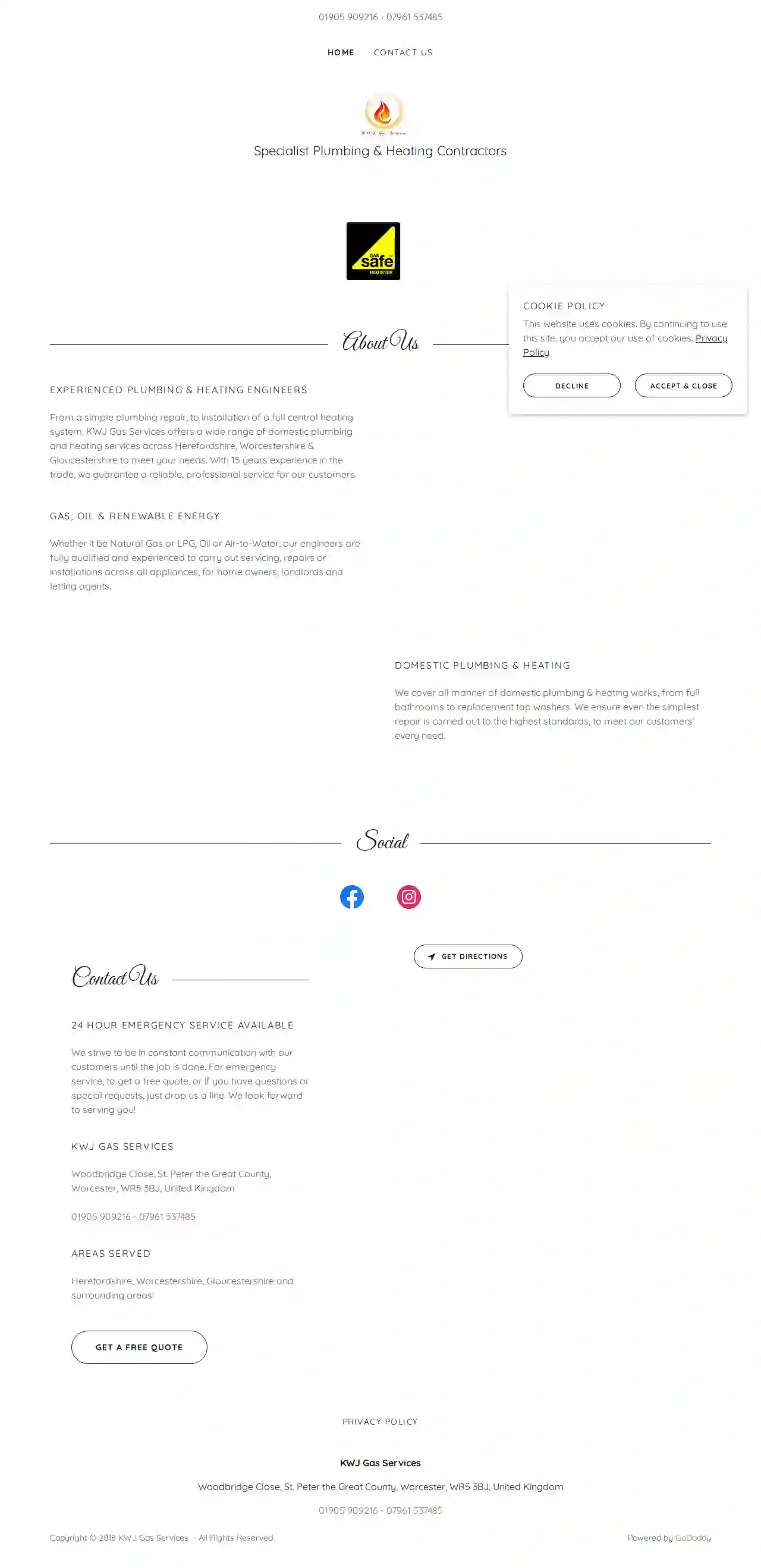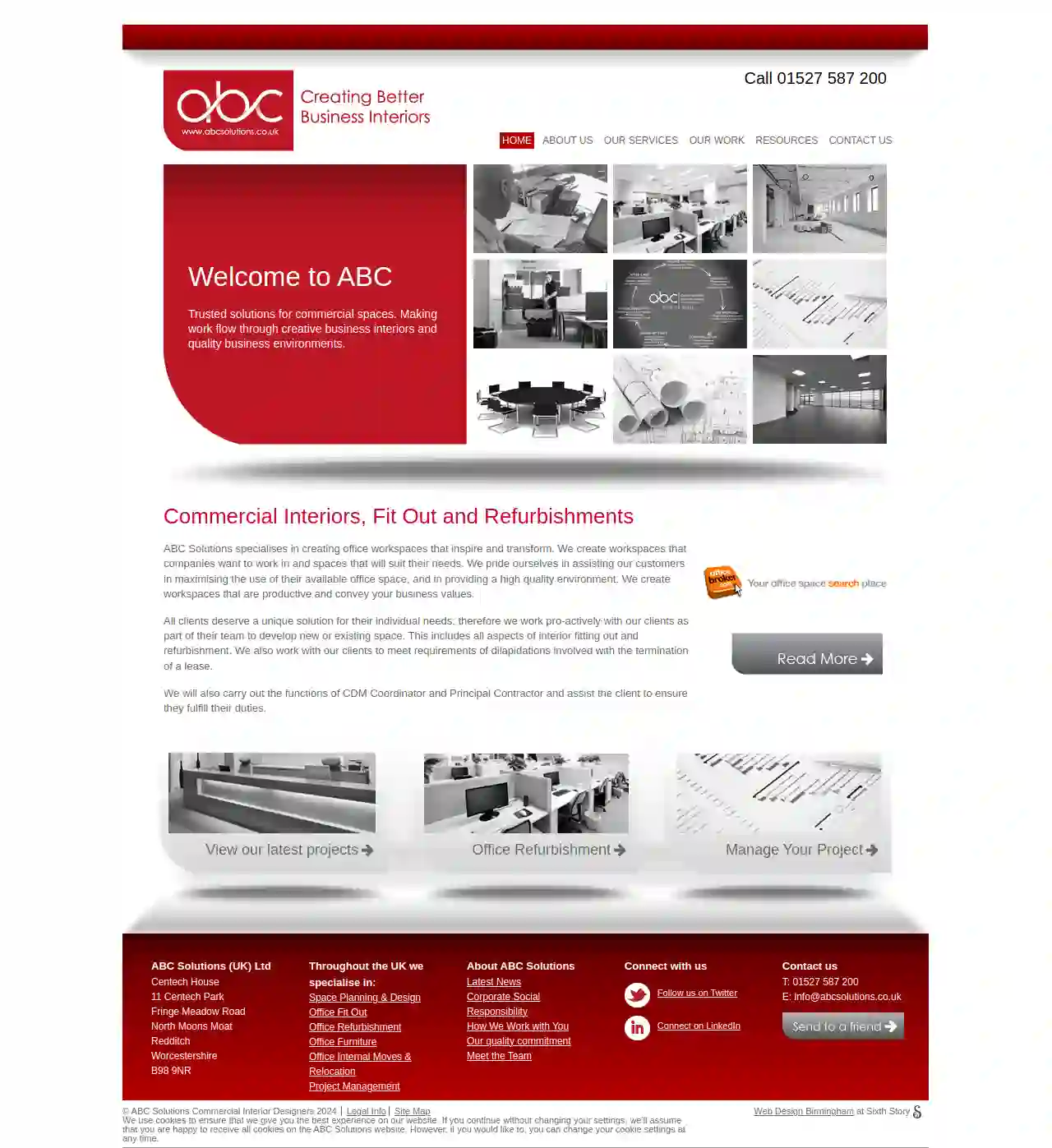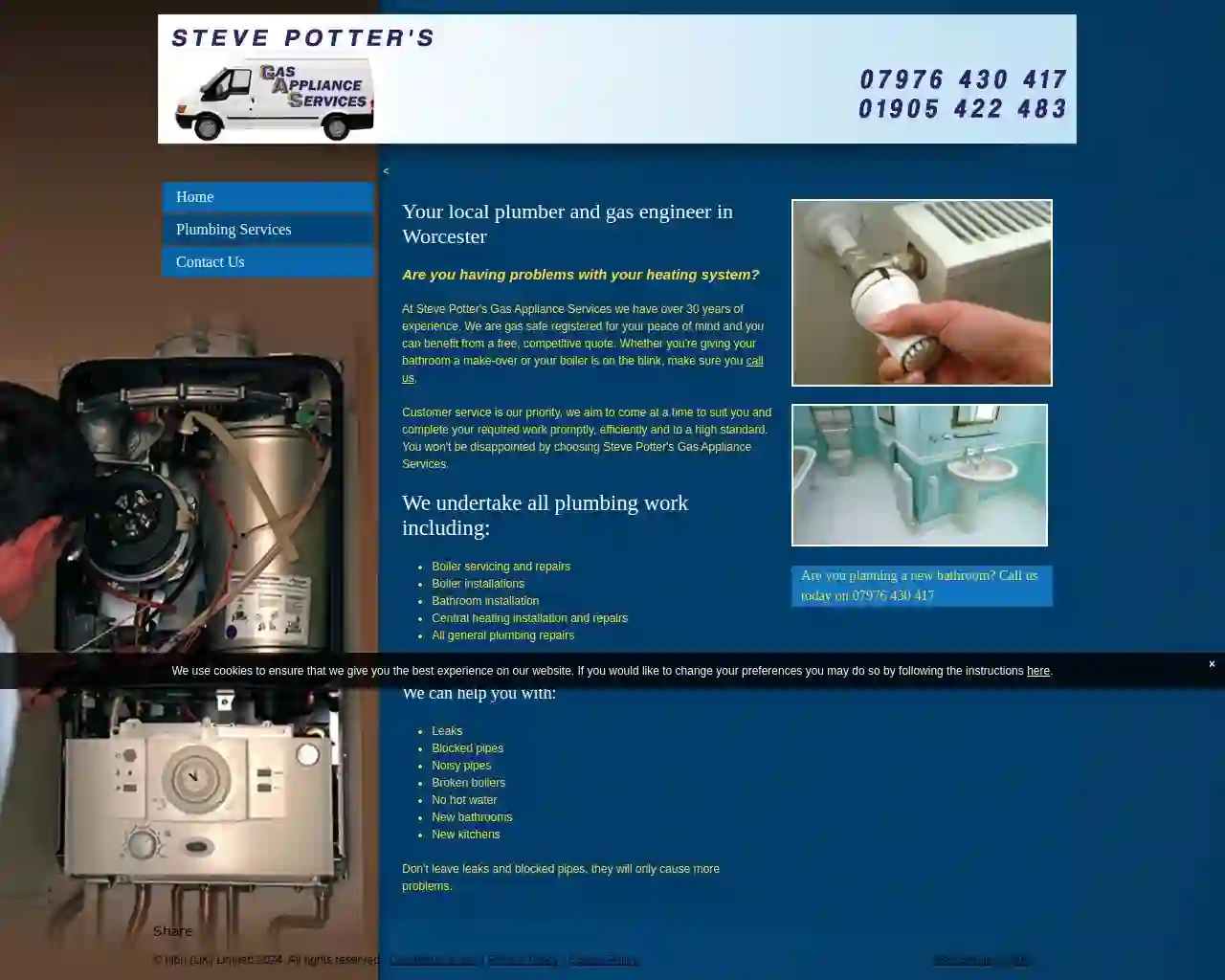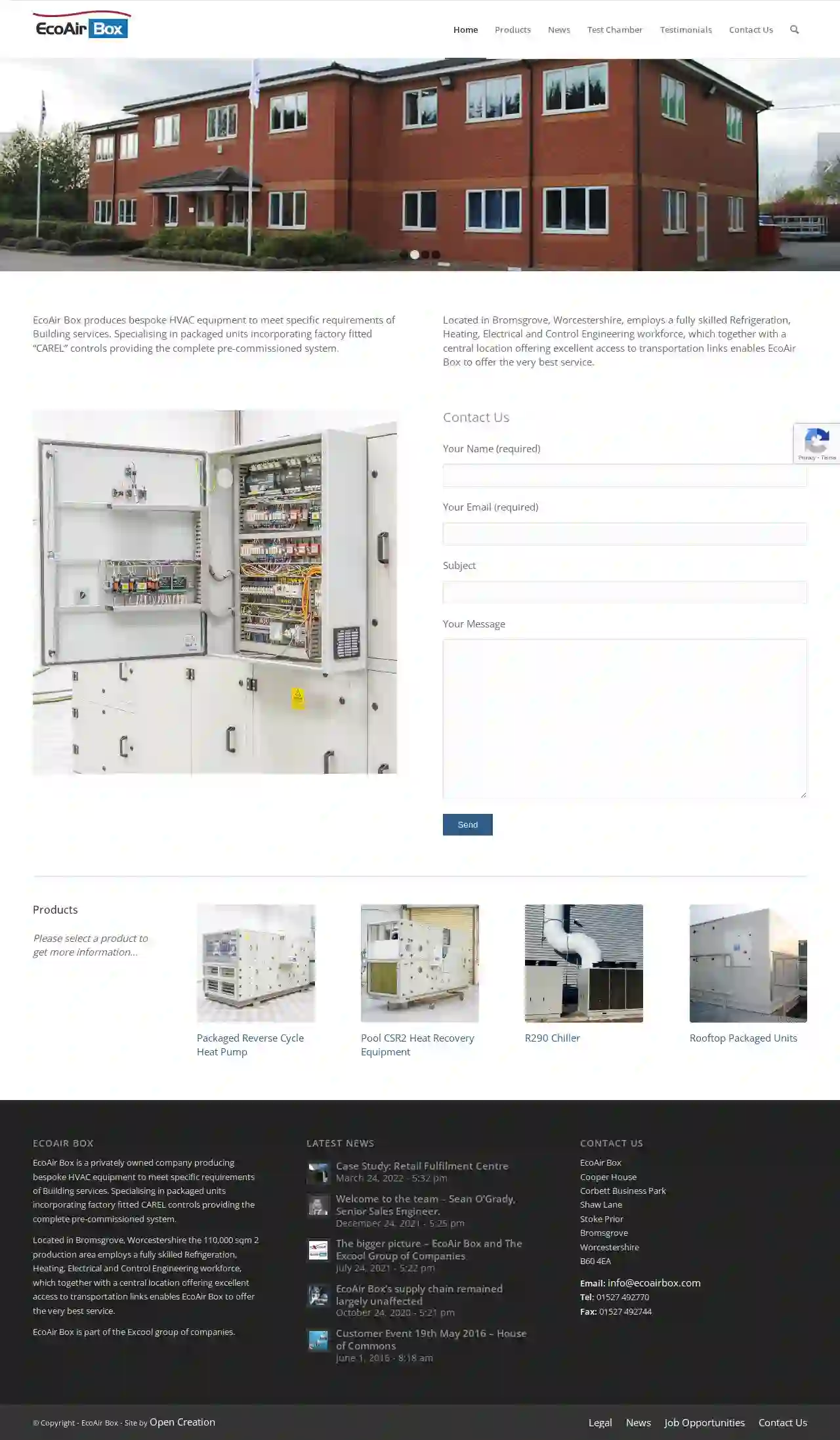Boiler Installation Stoke Prior
Find Boiler Replacement in Stoke Prior
Receive up to 3 Boiler Installation quotes for your project today! Compare profiles, reviews, accreditations, portfolio, etc... and choose the best deal.

KWJ Gas Services
51 reviewsWoodbridge Close, Worcester, WR5 3BJ, GBExperienced Plumbing & Heating Engineers From a simple plumbing repair, to installation of a full central heating system, KWJ Gas Services offers a wide range of domestic plumbing and heating services across Herefordshire, Worcestershire & Gloucestershire to meet your needs. With 15 years experience in the trade, we guarantee a reliable, professional service for our customers. Gas, Oil & Renewable Energy Whether it be Natural Gas or LPG, Oil or Air-to-Water, our engineers are fully qualified and experienced to carry out servicing, repairs or installations across all appliances, for home owners, landlords and letting agents. Domestic Plumbing & Heating We cover all manner of domestic plumbing & heating works, from full bathrooms to replacement tap washers. We ensure even the simplest repair is carried out to the highest standards, to meet our customers’ every need. 24 Hour Emergency Service Available We strive to be in constant communication with our customers until the job is done. For emergency service, to get a free quote, or if you have questions or special requests, just drop us a line. We look forward to serving you!
- Services
- Why Us?
- Gallery
Get Quote
Arrow Heating Solutions
54 reviewsExcalibur Buildings, Studley Rd, Redditch, B98 7YQ, GBWe are Redditch and Surroundings areas Leading Heating Installers for Worcester Bosch & DaIkin. We specialize in all aspect of heating your home, Boiler installations to innovative heating technologies, we are dedicated Worcester Bosch & DaIkin qualified installers, giving your fast, friendly and reliable service. Get a Quote For Your New Boiler → Check Out Our Finance Deals → Expert & Professional Services Free Quote Competitive Pricing 24-Hour Service Licensed & Insured Get a Heating Solution Quote
- Services
- Why Us?
- Accreditations
- Testimonials
- Gallery
Get Quote
Industrial Refrigeration Services Ltd
Bromsgrove, GBIndustrial Refrigeration Services Ltd (IRS Ltd) was founded in 1990, built on a reputation of quality services and cost-saving solutions. We are experts in energy management, embracing all aspects of industrial and commercial users of refrigeration, air conditioning and heat exchange systems. We work in a variety of sectors, including Cold Storage & Distribution, Education, Food, Drink & Confectionary, Manufacturing, Healthcare & Pharmaceutical, Leisure & Tourism Attractions, and Facilities Management. Our team is dedicated to delivering air conditioning, refrigeration, and maintenance, breakdown, and installation of services and solutions on varying equipment from small commercial systems to large, complex industrial systems.
- Services
- Why Us?
- Testimonials
- Gallery
Get Quote
ABC Solutions (UK) Limited
4.52 reviews11 Centech Park, Fringe Meadow Road, Centech House, Redditch, B98 9NR, GBWelcome to ABC Solutions, trusted solutions for commercial spaces. We make work flow through creative business interiors and quality business environments. ABC Solutions specialises in creating office workspaces that inspire and transform. We create workspaces that companies want to work in and spaces that will suit their needs. We pride ourselves in assisting our customers in maximising the use of their available office space, and in providing a high quality environment. We create workspaces that are productive and convey your business values. All clients deserve a unique solution for their individual needs; therefore we work pro-actively with our clients as part of their team to develop new or existing space. This includes all aspects of interior fitting out and refurbishment. We also work with our clients to meet requirements of dilapidations involved with the termination of a lease. We will also carry out the functions of CDM Coordinator and Principal Contractor and assist the client to ensure they fulfill their duties. Throughout the UK we specialise in: Space Planning & Design Office Fit Out Office Refurbishment Office Furniture Office Internal Moves & Relocation Project Management
- Services
- Why Us?
- Gallery
Get Quote
Oakland Air Control Ltd
4.73 reviewsWarndon Business Park, Prescott Drive, Worcester, WR4 9NE, GBOakland Air Control Ltd. provides planned preventive maintenance and reactive maintenance services for heating, ventilation, air conditioning, electrical and controls systems in residential, commercial and industrial buildings throughout Worcestershire and the UK. For sales, maintenance, general enquiries and out of hours emergencies call 0800 542 2580 or email [email protected] or complete the message box below. Follow us on LinkedIn and Twitter.
- Services
- Why Us?
- Gallery
Get Quote
Gas Appliance Services By Steve Potter
4.52 reviewsSt John's, Worcester, GBAt Steve Potter's Gas Appliance Services, we have over 30 years of experience in providing reliable and efficient plumbing and gas services in Worcester. As a family-run business, we pride ourselves on our professional, friendly, and efficient workmanship. We are Gas Safe registered and offer FREE quotes for installation work. Our prices are competitive, and we are IPHE registered. We cover Worcester and the surrounding villages, including St John's, Malvern, Callow End, Hallow Heath, and Black Pole. Whether you need a plumber or gas engineer, we are your first choice for all your plumbing and gas needs.
- Services
- Why Us?
- Our Team
- Gallery
Get Quote
Go Assist - Appliance Repairs, Plumbers, Boiler Engineers & Electricians
Bournemouth, BH8 8EY, Enterprise House, 21 Oxford Road, WR1 2LU, GBAt Go Assist, we provide a one-stop solution for homeowners and landlords, offering services regarding plumbing, electrical, appliances, boilers, locksmiths and pest control. Whether your domestic appliance is faulty, boiler has broken down, fuse box has tripped, or tap is leaking – you have come to the right place. We provide quality repairs for home breakdowns from a team of reliable, vetted engineers. We will always aim to get out to you the same day, boasting an impressive engineer response time and first-time fix rate. Our engineers are not only repair experts but are qualified to assist with installations and replacements such as light fittings, toilets, and showers, making home improvements an easy stress-free process. We are proud to provide services to help landlords abide by the necessary rules and regulations by carrying out boiler services, EPCS, and EICRs in rented properties.
- Services
- Why Us?
- Gallery
Get Quote
Heating Maintenance Services Ltd
4.934 reviewsMalvern, GBHeating Maintenance Services Ltd is a local heating specialist with over 60 years of experience. We're located in Malvern at the heart of Herefordshire & Worcestershire, covering Worcester, Malvern, Ledbury, Droitwich and Hereford. Our team of fitters and engineers are Worcester Bosch Accredited Installers with guarantees of up to 10 years. We're specialists in Johnson and Starley warm air heating and offer fixed price services. We also provide boiler repair, upgrade, and maintenance services, as well as renewable technologies and commercial heating systems. Our Service Safe Plan provides peace of mind with annual inspections and covers parts, labour, and an annual inspection. We're accredited by Gas Safe Register, OFTEC, and Worcester Bosch Group, and have a 10-year guarantee on our Worcester Bosch boilers.
- Services
- Why Us?
- Accreditations
- Gallery
Get Quote
EcoAir Box
3.85 reviewsCorbett Business Park, Shaw Lane, Cooper House, Stoke Prior, B60 4EA, GBEcoAir Box produces bespoke HVAC equipment to meet specific requirements of Building services. Specialising in packaged units incorporating factory fitted “CAREL” controls providing the complete pre-commissioned system. Located in Bromsgrove, Worcestershire, employs a fully skilled Refrigeration, Heating, Electrical and Control Engineering workforce, which together with a central location offering excellent access to transportation links enables EcoAir Box to offer the very best service.
- Services
- Why Us?
- Gallery
Get Quote
A C Heating and Plumbing
590 reviewsRedditch, GBAt A. C Heating & Plumbing, we are committed to giving the best customer satisfaction. We are a family-run business and have over 20 years of experience in the gas industry. Our professional team offer a wide range of services, including boiler servicing and breakdown repairs, full central heating installs, boiler installations, power flushing, upgrades, landlord safety checks, cooker installs, gas fire installs and landlord gas safety certificates. We are following all Government guidelines while working throughout the COVID-19 pandemic. We are wearing masks, regularly hand sanitising and social distancing to protect our customers and ourselves. *Discounts available for OAPs and NHS workers! Get in touch to find out more.*
- Services
- Why Us?
- Gallery
Get Quote
Over 12,692+ HVAC Businesses on our directory
Our HVAC companies operate in Stoke Prior and surroundings!
HVACCompaniesHub has curated and vetted Top HVAC Companies near Stoke Prior. Find a reliable pro today.
Frequently Asked Questions About Boiler Installation
- Carbon Monoxide Detectors: Install carbon monoxide detectors on every level of your home and ensure they're functioning correctly. Carbon monoxide (CO) is an odorless, colorless gas that can be produced by a malfunctioning boiler. . Detectors will alert you if there's a CO leak.
- Annual Service: Have your boiler serviced every year by a qualified technician. . This ensures it's running safely and efficiently.. A professional service can identify potential issues and prevent breakdowns.
- Check for Leaks: Periodically check for leaks or drips around your boiler and piping. If you find any, contact a qualified heating engineer for repairs..
- Know Your System: Understand your boiler's functions and components. Be sure to read the manual.
- Ventilation: Ensure the room or area where your boiler is installed has proper airflow. Never block any vents or air intakes.
- Gas Safety (for gas boilers): If you have a gas boiler, be aware of the signs of a gas leak, such as a rotten egg smell.
- Your boiler is more than 15 years old: Older boilers are much less efficient than modern condensing boilers and are more likely to break down, so upgrading to a new, energy-efficient boiler could save you significant amounts on your energy bills over time.
- Your boiler keeps breaking down: Frequent service calls might mean it's time for a new boiler.
- Your energy bills are increasing: An inefficient boiler uses more energy resulting in costly increases to your heating bills. Consider replacing it with an energy-efficient model.
- Your boiler is making strange noises: Unusual banging, whistling, or gurgling sounds might mean there is a serious issue with your boiler and require professional service.
- Your radiators are not heating up properly: Radiators not getting hot evenly or consistently could indicate a boiler malfunction, air in the system, or circulation problems.
- Low water pressure: Low water pressure might mean your boiler is not functioning optimally. Have a heating engineer inspect the system.
- Leaks or drips near your boiler: If you notice leaks or drips around your boiler, turn off your boiler and immediately contact a qualified heating engineer to assess and fix the issue.
- Pilot light goes out frequently: A faulty pilot light is often a sign of bigger issues to come.
- Yellow flame instead of blue: A yellow flame on a gas boiler can mean there is incomplete combustion or a dangerous carbon monoxide leak. If you see a yellow flame, turn off the boiler and contact a qualified technician immediately..
- Combi Boilers (Combination Boilers): Most common and provide both heating and hot water instantly , They are compact and ideal for smaller spaces. If you use a lot of hot water, consider other options.
- Regular Boilers (Conventional, Heat-Only Boilers): More complex systems that involve both a storage tank and a hot water cylinder. If you have multiple bathrooms or high hot water demand, then this is a good choice.
- System Boilers: These boilers heat your central heating directly and also store hot water in a cylinder. They are more compact than regular boilers but more expensive than combi boilers. . Homes with two or more bathrooms benefit from this type of system.
- Condensing Boilers: High-efficiency boilers recycle heat from exhaust gases to pre-heat water, minimizing waste. They're better for the environment and can save you money in the long run.
What safety precautions should I take with a new boiler?
What is the difference between a regular boiler and a system boiler?
What are the signs that I need a new boiler?
What are the different types of boilers?
What safety precautions should I take with a new boiler?
- Carbon Monoxide Detectors: Place CO detectors in strategic locations and ensure they're functioning correctly. Carbon monoxide (CO) is a deadly, invisible gas. Detectors will alert you if there's a CO leak.
- Annual Service: Have your boiler serviced annually. This ensures it's running safely and efficiently.. A professional service can identify potential issues and prevent breakdowns.
- Check for Leaks: Periodically check for leaks or drips around your boiler and piping. If a leak is detected, seek professional service.
- Know Your System: Understand your boiler's functions and components. Read the manufacturer's instructions for safe operation and maintenance tips. .
- Ventilation: Ensure the room or area where your boiler is installed has proper airflow. Never block any vents or air intakes.
- Gas Safety (for gas boilers): If you detect a gas leak, immediately turn off the gas supply, open windows for ventilation, and evacuate the building. Contact your gas company from a safe location.
What is the difference between a regular boiler and a system boiler?
What are the signs that I need a new boiler?
- Your boiler is more than 15 years old: Consider replacing an older unit with a new, high-efficiency boiler.
- Your boiler keeps breaking down: If your boiler requires frequent repairs, it might be more cost-effective to replace it in the long run.
- Your energy bills are increasing: An inefficient boiler uses more energy resulting in costly increases to your heating bills. Consider replacing it with an energy-efficient model.
- Your boiler is making strange noises: Unusual banging, whistling, or gurgling sounds might mean there is a serious issue with your boiler and require professional service.
- Your radiators are not heating up properly: Radiators not getting hot evenly or consistently could indicate a boiler malfunction, air in the system, or circulation problems.
- Low water pressure: Low water pressure can be a symptom of issues with the boiler. A qualified technician should investigate the problem. .
- Leaks or drips near your boiler: If you notice water pooling around your boiler, turn off your boiler and immediately contact a qualified heating engineer to assess and fix the issue.
- Pilot light goes out frequently: A faulty pilot light is often a sign of bigger issues to come.
- Yellow flame instead of blue: A yellow flame on a gas boiler can mean there is incomplete combustion or a dangerous carbon monoxide leak. If you see a yellow flame, turn off the boiler and contact a qualified technician immediately..
What are the different types of boilers?
- Combi Boilers (Combination Boilers): Most common and provide both heating and hot water instantly , saving space by eliminating the need for separate hot water tanks or cylinders. If you use a lot of hot water, consider other options.
- Regular Boilers (Conventional, Heat-Only Boilers): These boilers require both a cold water storage tank (usually in the loft) and a hot water cylinder (usually in an airing cupboard), taking up more space. If you have multiple bathrooms or high hot water demand, then this is a good choice.
- System Boilers: They have components built in, reducing installation time and complexity. They are generally a good middle ground between other options. Homes with two or more bathrooms benefit from this type of system.
- Condensing Boilers: Highly efficient units that improve energy efficiency by reusing heat from the flue gases. These are more expensive initially but reduce energy consumption and operating costs.